Key Takeaways
- Titanium is graded by purity and strength, with Grades 1–4 being commercially pure and Grade 5 being a high-performance alloy used in aerospace and premium watches.
- Grade 2 titanium is ideal for watch bands, offering the best mix of lightweight comfort, durability, and skin-friendliness, making it the most commonly used grade in modern wearables.
- Grade 5 (Ti-6Al-4V) is the strongest and most durable, perfect for rugged or luxury watches, though it’s slightly heavier and more expensive due to its alloy composition.
- Grades 1, 3, and 4 are rarely used in consumer watches, either because they’re too soft (Grade 1), too hard to manufacture (Grade 3), or too heavy and rigid (Grade 4).
- RobustGoods uses Grade 2 titanium for its bands, offering the ideal mix of strength, comfort, and durability, built to match your smartwatches.
What Are Titanium Grades?
Titanium grades refer to standardized categories that define the metal’s purity, strength, and composition. These classifications are regulated by international bodies such as ASTM (American Society for Testing and Materials) and ISO. Each grade reflects a different balance of properties, which is why they’re so important when choosing materials for precision products like watches.
Grades 1 through 4 are known as commercially pure titanium. These grades contain almost no added elements, just trace differences in oxygen and iron content that influence strength, softness, and corrosion resistance. The higher the grade number (within this range), the stronger and less ductile the titanium becomes.
Grade 5, often called Ti-6Al-4V, breaks from the "pure" category. It’s an alloy, made of 90% titanium, 6% aluminum, and 4% vanadium. This blend significantly boosts strength and hardness, making it one of the most widely used titanium grades in aerospace and high-end consumer products, including rugged and performance-driven watches.
Understanding the difference between pure grades and alloys is critical in watchmaking. Each grade behaves differently in terms of finish, weight, comfort, and resistance to wear. Choosing the right titanium grade isn’t just about durability—it affects how the watch feels on your wrist, how it ages over time, and whether it can hold up to your everyday use.
|
RobustGoods: Premium Apple Watch Ultra Bands Built to Last 100,000+ Trusted Customers | 4.55★ Rating | 2,000+ Positive Reviews Crafted for the Apple Watch Ultra:
The RobustGoods Difference: ✓ Direct-to-consumer manufacturing (no middlemen markup) Quality You Can Trust: Founded by a Finnish tech enthusiast in 2020, we've built our reputation on durability, style, and functionality. Every band comes with a 60-day guarantee and worldwide shipping. Upgrade your Apple Watch Ultra with accessories as rugged as you are. |
Titanium Grades Explained: From Grade 1 to 5
1. Grade 1 Titanium
Grade 1 titanium is extremely lightweight and highly resistant to corrosion, even in saltwater environments. However, it’s also the softest of all grades, which makes it unsuitable for watches and accessories that endure daily wear.
Because it scratches and deforms easily, it’s almost never used in watch cases or bands. You’ll mostly find it in medical and industrial settings where flexibility matters more than surface durability.
From soft to nearly indestructible, titanium grades affect how your watch looks, feels, and performs.
2. Grade 2 Titanium
Grade 2 is one of the most commonly used grades in both titanium watch bands and cases. It has an ideal mix of lightweight, strength, and corrosion resistance, making it perfect for everyday wear.
This grade is also hypoallergenic and comfortable on skin, which is why many premium bands and Ultra-compatible cases rely on it. Bands made from Grade 2 titanium typically range from $79 to $179, depending on finish, design, and buckle hardware.
3. Grade 3 Titanium
Though stronger than Grade 2, Grade 3 titanium is rarely seen in watches. It’s difficult to machine, heavier, and doesn’t offer a polished finish easily. These factors make it unappealing for consumer products where comfort, appearance, and efficiency in production are key.
Most brands skip it entirely, so you're unlikely to find any watch bands or cases made from Grade 3 outside of industrial-style custom builds.
4. Grade 4 Titanium
Grade 4 is the strongest of the commercially pure grades. It holds up well in tough environments, offering high resistance to chemicals and saltwater exposure. However, its added weight and rigidity make it less comfortable to wear, especially in band form.
It’s sometimes used in ruggedized or tool-style watch cases designed for harsh use but is still rare in mainstream products. If used at all in bands, expect higher prices, usually above $299, and a more utilitarian finish.
5. Grade 5 Titanium (Ti-6Al-4V)
Grade 5 is the go-to material for high-performance watchmaking. As a titanium alloy with added aluminum and vanadium, it offers unmatched strength and durability while maintaining a manageable weight.
It also accepts a wide range of finishes, from matte to brushed to DLC coatings, making it a favorite in both luxury bands and premium watch cases. Grade 5 bands typically sell for $349, depending on design complexity and finish treatments.
A Grade 2 titanium band with brushed finish pairs perfectly with the Apple Watch Ultra's natural titanium casing.
Titanium Grade Comparison Table
|
Property |
Grade 1 |
Grade 2 |
Grade 3 |
Grade 4 |
Grade 5 (Ti-6Al-4V) |
|
Purity |
~99.8% |
~98.8% |
~98% |
~90% |
90% (alloyed) |
|
Strength |
Low |
Moderate |
High |
Very High |
Extremely High |
|
Corrosion Resistance |
Excellent |
Excellent |
Very Good |
Excellent |
Good |
|
Weight |
Very Light |
Light |
Medium |
Heavy |
Medium-Heavy |
|
Machinability |
Easy |
Easy |
Hard |
Very Hard |
Moderate |
|
Comfort for Wearables |
High |
Very High |
Low |
Medium |
High (if coated) |
|
Watch Industry Use |
Rare |
Common |
Rare |
Rare |
Common (premium) |
*Note: Pricing and/or product availability mentioned in this post are subject to change. Please check the retailer's website for current pricing and stock information before making a purchase.
Which Titanium Grade Is Best for Your Watch Bands and Cases?
If you’re buying a titanium watch or band, the grade makes a huge difference, both in performance and long-term comfort.
- Grade 2 is the go-to choice for most modern, high-quality watch bands. It’s light, durable, hypoallergenic, and perfect for everyday wear.
- Grade 5 is excellent for ruggedness and premium feel, especially if you want something industrial or long-lasting, but may feel slightly heavier.
- Grades 1, 3, and 4 are far less common in watches. Grade 1 is too soft, Grade 3 is too hard to machine, and Grade 4 is too heavy for comfort-focused wearables.
When in doubt, always ask which titanium grade a product uses. Transparent brands will tell you. And if they don’t, that’s your first red flag!
Why RobustGoods Uses Grade 2 Titanium in Its Watch Bands
At RobustGoods, we believe your smartwatch deserves materials that match its performance and its price tag. That’s why we rely on Grade 2 titanium in our signature bands. It strikes the perfect balance of durability, lightweight comfort, and corrosion resistance, making it ideal for all-day wear on both Apple Watch and Samsung Galaxy Watch models.
Higher grade doesn’t always mean better. It depends on how and where it’s being used.
Our titanium bands are engineered for strength without sacrificing style. Each one is designed to match the finish and fit of your device, whether it’s the Apple Series 10 or the Samsung Galaxy Watch Ultra, with scratch-resistant DLC coatings, premium clasps, and precision-machined links.
Not sure if it's the right fit? No worries. Every purchase is backed by our 60-day money-back guarantee. Try it on, wear it out, and if you’re not 100% satisfied, we’ll make it right.
We also keep things simple and honest. By cutting out middlemen and retail markups, we’re able to offer premium-grade materials, like Grade 2 titanium and Italian full-grain leather, at a fair price. The result? Bands that feel as good as they look, and perform even better.
If you wear an Apple or Samsung smartwatch, RobustGoods makes bands that respect your device and upgrade your experience. Strong, timeless, and built to outlast trends.
Frequently Asked Questions (FAQ)
Why do different titanium grades matter in watches?
Each grade has a unique balance of strength, weight, corrosion resistance, and cost. The right grade depends on how the watch will be worn—daily, for sports, or for luxury occasions.
Is Grade 5 titanium overkill for a watch band?
Not necessarily. If you want maximum durability, scratch resistance, and a premium finish, Grade 5 is worth the investment, especially for rugged or luxury timepieces.
Can titanium bands be worn during workouts or in water?
Yes. Titanium resists sweat, water, and corrosion, making it an excellent choice for fitness enthusiasts and swimmers. Just avoid leather accents if you plan to swim regularly.
Is titanium better than stainless steel for watches?
Titanium is lighter, more corrosion-resistant, and hypoallergenic compared to stainless steel. However, stainless steel can offer more shine and is generally more affordable.
How do I adjust the size of a titanium watch band?
All RobustGoods bands come with a free sizing tool included in the box. You can easily add or remove links to get the perfect fit for your wrist.

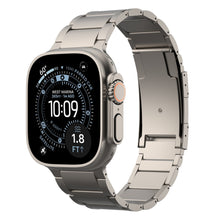
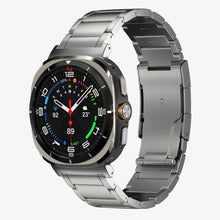
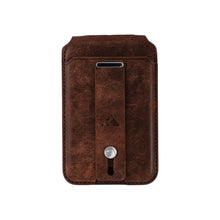
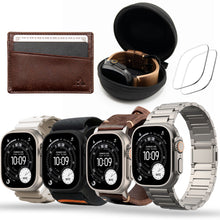
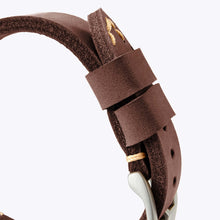
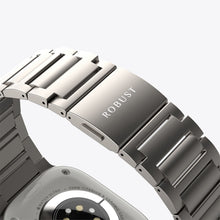
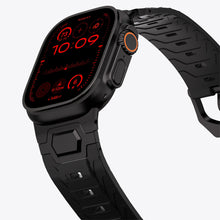
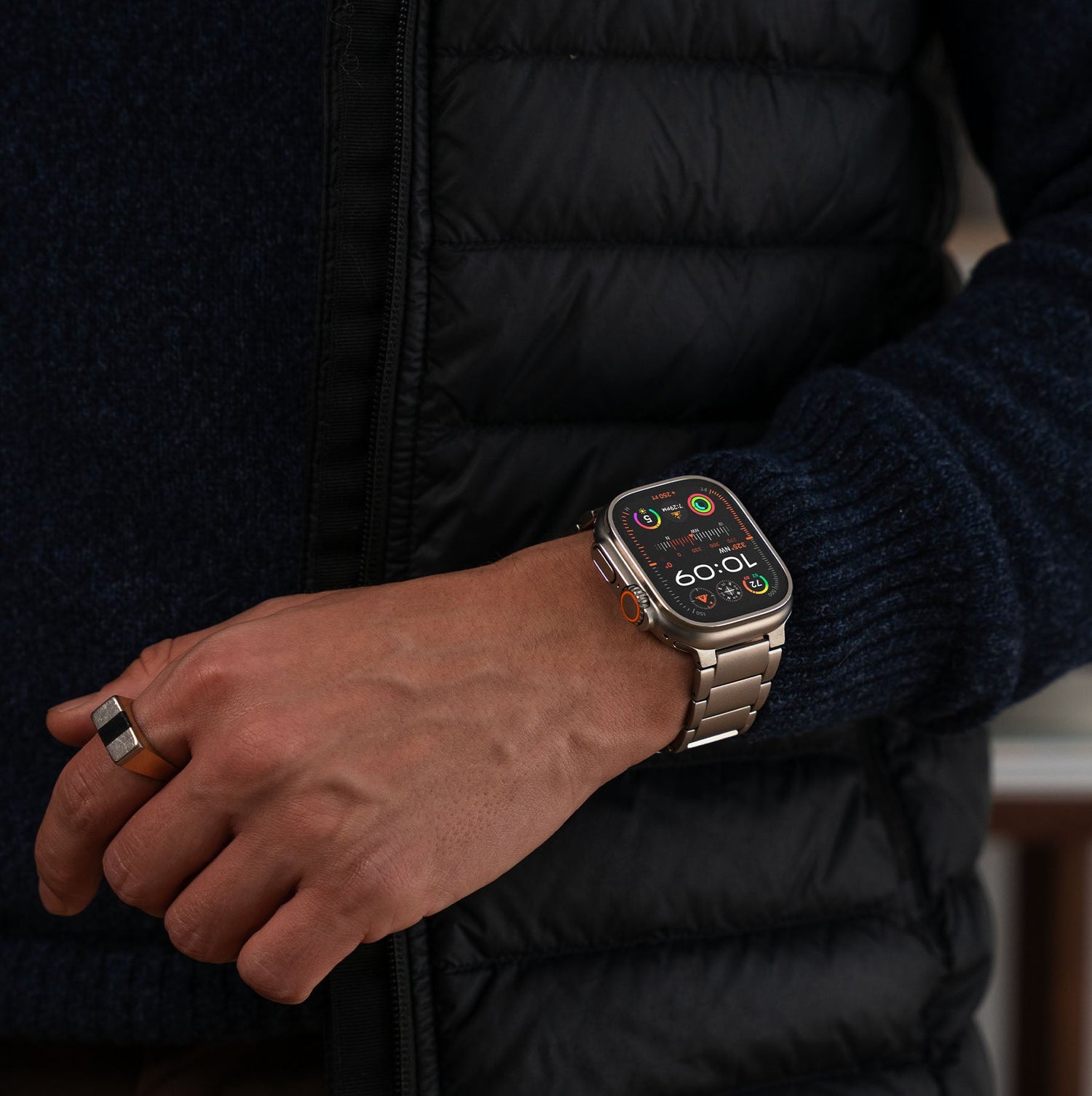
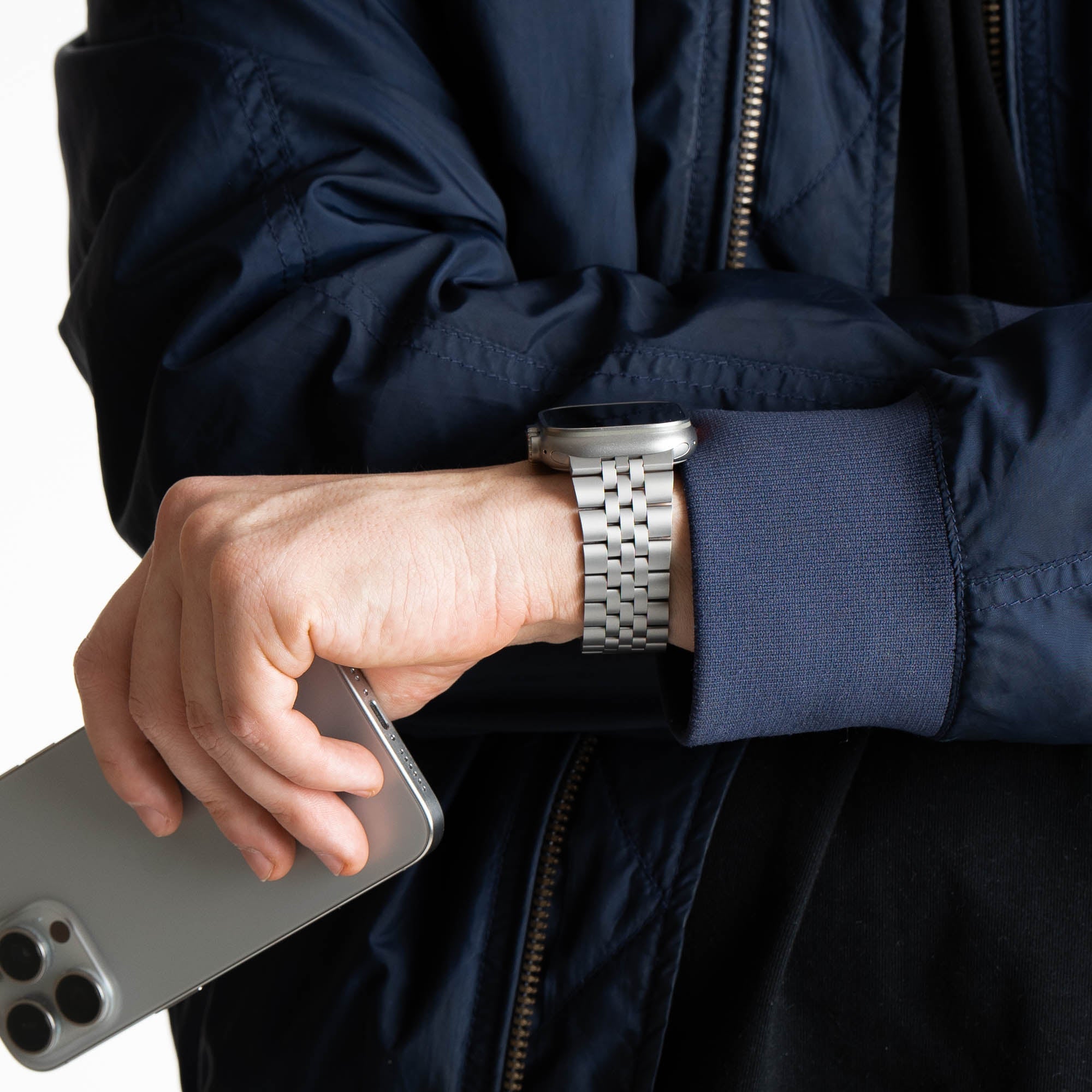
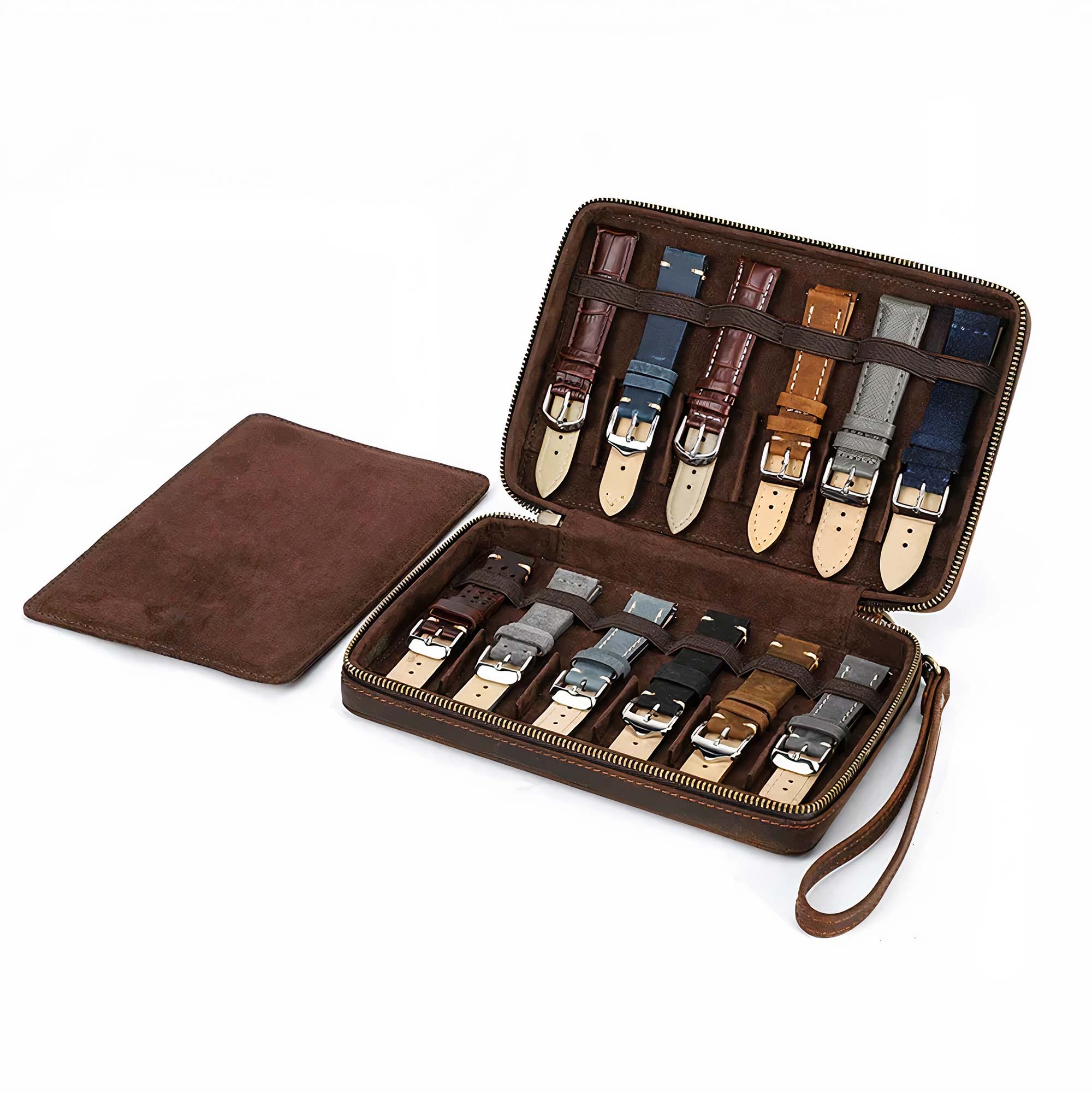
Leave a comment
This site is protected by hCaptcha and the hCaptcha Privacy Policy and Terms of Service apply.